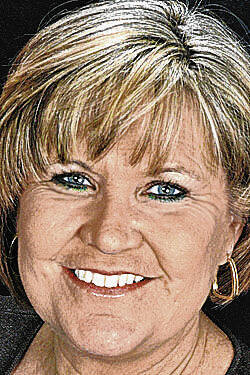The Christmas present my daughter gave me evoked laughter and blubbering last week.
More accurately, by the time I finished it, I was full-on into a shoulder-shaking, cheek-flooding, messy-tears sob.
I started to read the book between Christmas and New Years, but couldn’t seem to get into it and laid it aside. While we were snowed in on vacation, I picked it up again, forced myself to trudge through the first four chapters, getting used to the embedded fairy tale arc, then found myself mesmerized and couldn’t put it down.
By the time I had gotten to the seventh chapter of Fredrik Backman’s “My Grandmother Asked Me to Tell You She’s Sorry,” I was bending back page corners to so I could go back and ask my daughter to clear up any Lord of the Rings and Harry Potter book reference nuances I may have missed.
The book is told from the point of view of a 7-year-old named Elsa, who is “different,” and her “crazy” 77-year-old grandmother. The book is about life, death and grief and is a real-life, comically-told, but touching fairytale about the power of stories to inspire and heal.
Maybe it was because I am also in a Bible study examining the Book of James and we had just focused on the third chapter about the tongue: “No one among mankind can tame the tongue, it is a restless evil, full of deadly poison. With it we bless our Lord and Father, and with it we curse people who have been in the likeness of God … these things should not be this way.”
I’m sure I was convicted about my own tongue, but I couldn’t help but find the ironic humor in Backman’s telling of Elsa being constantly bullied by a classmate for wearing a Gryffindor scarf:
“Only after she’d smacked Elsa in the face, ripped her scarf, and thrown it in a toilet had Elsa grown conscious of the fact that the girl hadn’t read Harry Potter at all. She knew who he was, of course, everyone knows who Harry Potter is, but she hadn’t read the books. She didn’t even understand the most basic symbolism of a Gryffindor scarf. And while Elsa didn’t want to be elitist or anything, how could one be expected to reason with a person like that?
Muggles.
So today when the girl in the cafeteria had reached out to snatch away Elsa’s scarf, Elsa decided to continue the discussion on the girl’s own intellectual level. She simply threw her glass of milk at her and ran for it.”
I texted Chloe (my middle daughter who gifted me the book) that in an attempt to tame my wicked tongue, if anyone ever speaks a bullyish mean shady word I would hereafter only retaliate with a whisper of, “Muggles.”
Chloe texted back, “I feel like ‘Muggles’ is the nicest way to insult someone.”
As the chapters unraveled, I was repeatedly faced with the thought that Swedish author Backman is such a genius writer, and that I should just lay my pen aside and never attempt to write again. I remembered taking Dad and Mom to the International Fingerstyle Guitar Competition in Nashville, Indiana, about seven years ago. After Dad, a talented musician, enjoyed and watched the competition intently, he joked with a broad smile, “Well, I guess I’m going to have to hang up my guitar now.”
By the time I got to the 19th chapter of 34, I was yellow highlighting Backman’s great lines, such as, “… she senses the smell of tobacco smoke, the same kind of tobacco that Granny used to smoke … It’s strange how quickly the significance of a certain smell can change, depending on what path it decides to take through the brain. It’s strange how close love and fear live to each other.”
And the humorous: “’Never mess with someone who has more spare time that you do,’ Granny used to say.”
Backman swiftly brought my mind back to my study of the Book of James, when his story unraveled, and little Elsa began to realize that the mean or scary adults around her all have hard stories and the reasons behind why they act the way they do. The Book of James reiterates that favoritism or partiality is a sin and we are not to judge others, but to have mercy. James 2:13 notes, “Mercy triumphs over judgement.”
Backman wrote about Elsa, “On her sixth birthday, Granny told her the story of the sea-angel. To teach her that not all monsters are monsters in the beginning, and not all monsters look like monsters. Some carry their monstrosity inside.”
Two pages later he adds, “Because not all monsters were monsters in the beginning. Some are monsters born of sorrow.”
Sobbing as I finished page 370, I texted Chloe, who is blessing the hubby and I with our first grandson in a few weeks, God-willing. I thanked her for the book and shared a number of thought-provoking quotes.
Chloe texted back that she was struck by a particular quote, which was the reason she gave me the book:
“Having a grandmother is like having an army. This is a grandchild’s ultimate privilege: knowing that someone is on your side always, whatever the details. Even when you are wrong. Especially then, in fact. A grandmother is both a sword and a shield.”





